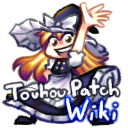Touhou Patch Center:About
Project overview
| ||||||
|---|---|---|---|---|---|---|
About |
Tutorial |
FAQ |
Download |
Patch servers |
 [https://github.com/thpatch/thcrap/issues [https://github.com/thpatch/thcrap/issues Bug tracker |
Wiki security |
This is our attempt at a new approach to create game patches. It is...
| multilingual | – supporting game translations for any language you want | |
|---|---|---|
| self-updating | – instant releases reflecting the current translation consensus | |
| open | – integrating anyone into the translation and hacking process | |
| long-term | – preparing today for the games of tomorrow |
In doing all this, we break away from the classic ‘romhacking’ tradition and the notion of secluded ‘translation groups’ and bring game patching directly to the fans.
If you think about it, the majority of the non-Japanese Touhou fandom completely hinges on the contributions of a small number of translators. This project honours their contributions to this fandom and supports them in an unprecedented way.
Motivation
There are quite a number of reasons to undertake such a project. This is a list of them in the order they came up.
Accuracy
The whole idea was born after witnessing yet another translation debate on touhouwiki.net. After a while, you realise that Touhou translations never seem to be final.
No matter how long a particular translation of some aspect has endured, years later, someone with perhaps a bit more knowledge of Japanese culture can come in, debate it and eventually have it changed. During these debates, people are sometimes shocked about how little sense the original translation made or how it distorted the original meaning, and thus, the general perception of the content. That's why touhouwiki.net's policy openly encourages this process.
In the end, the wiki page everyone looks at is edited and the correction is made. And all of this would be fine if we were merely translating pieces of literature.
But we're talking about games here. The English patches stay frozen at a certain state and are never updated - because their original developers continue to believe in their own translation, they considered the job done as soon as they've released the patch, or even have long abandoned this fandom in case of the older games.
At a first glance, we don't look very different. We, too, use a wiki system where translations can be edited by anyone. But not only do we provide a convenient translation interface to make this process as simply as possible, our pages are also written in such a way that they, after some initial configuration, can be automatically parsed and converted back to the original game formats.
This way, we get completely rid of situations where an old patch differs from the text in the wiki. Then, even common fans not interested in the patching process will be sensitised for the fact that Touhou translations may be debated for years to come - but now, these changes reach them immediately.
Speed
The former privilege of playing Touhou in English has now turned into an expectation. Patches are now demanded by the fandom, and they are expected to be finished in a reasonable amount of time.
We're going to satisfy this demand by completely separating the technical modification and hacking process from the translations. The time this process takes depends on the complexity of the game's programming, our experience & knowledge of the game's data formats, and the useless encryption applied on those.
This is going to become very apparent once ZUN releases a new Touhou game.
And this is the only "release date" that will matter. The fandom then experiences how the game is incrementally translated as they play it. A certain translation patch then only is done once the translators, working independently of the administration, have finished translated everything. Yes, this means that our patches will stay unfinished, slightly incorrect and a bit ugly for quite a while. But for the majority of Western fans who have little to no knowledge of Japanese, it will be better than having no patch at all.
Multilingualism
Now we have an automatic engine to quickly patch the games... but then, why should we limit ourselves to just translating into English?
As we supply the entire automatised infrastructure required to patch the games anyway, we reduce the adaptation to any other language to the mere input of the translated text and the editing of some graphics. Thus, we can effectively promote translations to languages where an ‘old-school patch group’ would have never existed or been considered necessary.
Existing patching groups can benefit from this system, too. By working with us, they'll...
- save hacking work and the resulting duplication of effort
- receive permanent hosting on our server
- and their translations will get more exposure
- whilst retaining full credit for their work.
Just start translating into your language, and you will have a working patch in no time.
But just... Why? Why all this madness?
D'you remember the time when Touhou was the best thing ever?
When it seemed like a never-ending source of varied and high-quality content, made possible by the intense dedication of people like you and me?
No? But we sure do. And we want to savour this feeling.
You have certainly heard the legends that there is fanart of new characters 20-30 minutes after a new game's release on the respective doujin convention. So why should you wait up to 2 months for an English patch, and that was it? With our system, the fans themselves can instead openly display the same amount of dedication to patches that we have seen in fanart for a long time.
Other advantages
Patch stacking
Our engine allows to use an unlimited amount of patches at the same time, sorted through a priority list.
Let's imagine you've got a thorough understanding of English, but would rather want to play a certain game in Spanish. Unfortunately, the Spanish translation of that game hasn't been finished, but the English one has. In this case, you would download and activate both the English and the Spanish patch and put the Spanish patch on top of the English one. Now, all text that has been translated to Spanish appears in Spanish, and the rest appears in English - all whilst running on top of the same, unmodified game executable.
In addition, you are also able to select the types of data each patch is allowed to modify. To use the above-mentioned example again, you can, for example, keep spell cards or music titles in English to keep a common ground for forum discussions.
As with the whole engine, this isn't limited to languages only. Every single patch that uses this engine can be re-used and combined with other patches. Thus, our engine could also be used to implement things like hitbox display removal, Vsync patches, replay desynchronisation bugfixes... the possibilities are endless.
No duplication of game data, no installation
In our case, this is more of a necessity resulting from all the other features than a clear feature or design goal on its own. This also comes with the nice additional benefit that the game directory stays clean and unmodified - instead of being crammed with lots of modified data files and patch loaders.
About this site
Oh no, not another Touhou Wiki.
Except that this is not ‘another Touhou Wiki’. We don't have articles on characters, locations or the 9001st Embodiment of Scarlet Devil arrangement album, and don't aim to compete with any websites claiming to be Touhou encyclopaediae, no matter the language.
Terminology
- Touhou Patch Center (abbr.
thpatch) - Name of this website and the server-side data conversion modules.
- Touhou Community Reliant Automatic Patcher (abbr.
thcrap) - Name of the patch engine - i.e. all code written for this project.
- Yes, the abbreviation is deliberate. We thought it would be a funny contrast to have a well-made piece of software with a name showing the developer's actual distaste for the subject matter.
- If you find that too offensive, just think of it as an anagram of
patchr.
- Touhou Patch Wiki
- Initial name of this website - quickly made up on the spot when this project split off from the German Touhou Wiki. In view of all the other Touhou wikis in existence, this one only increases the general confusion. Don't use it.


